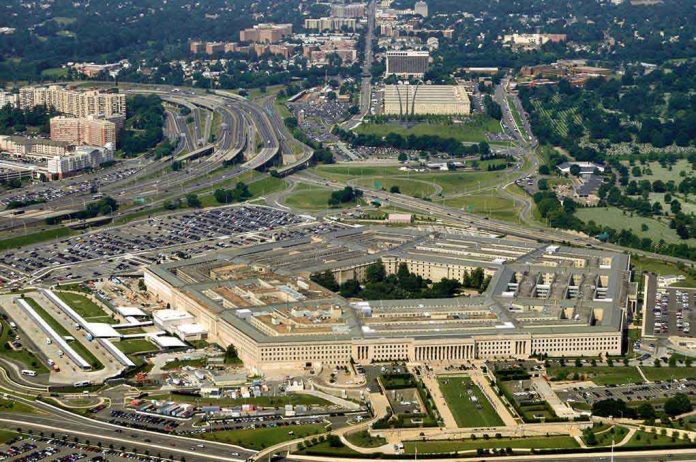
The Pentagon’s decision to exclude Chinese nationals from servicing its cloud systems marks a significant shift in U.S. national security policy, drawing both praise and criticism.
Story Highlights
- The U.S. Department of Defense has stopped allowing Chinese nationals to service its cloud systems.
- This decision follows concerns over national security and data integrity.
- Defense Secretary Lloyd Austin emphasizes prioritizing national security over profits.
- Congressional debates continue over defense procurement and contractor obligations.
DoD’s New Security Measures
The U.S. Department of Defense (DoD) has recently announced a new policy barring Chinese nationals from servicing its cloud systems. This move is part of a broader effort to bolster national security by minimizing foreign influence in critical infrastructure. The decision aligns with Secretary of Defense Lloyd Austin’s ongoing emphasis on prioritizing U.S. national security over contractor profits. The DoD’s strategy reflects growing concerns about data security and geopolitical tensions, particularly with China.
This policy is not only a response to potential security breaches but also a reflection of conservative values prioritizing national interests. By eliminating foreign nationals from roles that could impact sensitive data, the DoD aims to ensure greater control over its technological assets. Secretary Austin’s stance is clear: national security takes precedence, a sentiment echoed by many within the defense community who advocate for reduced dependency on foreign entities.
Legislative Context and Industry Pushback
The decision comes amid ongoing debates in Congress about defense procurement practices and legislative changes, including the controversial “right to repair” mandate in the FY2025 National Defense Authorization Act (NDAA). This mandate, which requires contractors to provide the DoD with tools for independent maintenance, has faced significant opposition from major defense firms. These companies argue that such policies threaten their proprietary interests and could increase operational costs.
Despite industry pushback, proponents of the mandate argue that it enhances transparency and aligns with national security interests. The debate highlights the tension between private sector profitability and governmental oversight, a recurring theme in U.S. defense policy. As negotiations continue, the DoD remains firm on its stance that contractor obligations must align with broader security objectives.
Impact on Defense Procurement
In the short term, the exclusion of Chinese nationals from cloud servicing could lead to increased scrutiny of existing contracts and potential delays in awarding new ones. Defense contractors may face challenges as they adapt to the new requirements, potentially leading to increased costs for the DoD. However, the long-term implications could result in a more secure and autonomous defense supply chain, less reliant on foreign entities.
Hegseth Announces Chinese Nationals No Longer Service Pentagon’s Cloud Systems https://t.co/I0rzpRfaME
— justnoseyingaround (@Mary28590250) August 28, 2025
For taxpayers and military personnel, the impact of these changes will depend on the successful implementation of the new policies. While there may be initial financial outlays, the potential for enhanced security and reduced dependency on external contractors could result in savings and improved readiness. The broader implications for the defense industry could include shifts in procurement practices and increased emphasis on domestic innovation and transparency.
Sources:
Contractors Oppose the Right-to-Repair Mandate Proposed Under NDAA 2025
Pentagon Leaders Say the Budget Process Hurts National Security – They’re Right
Statement from Secretary of Defense Lloyd J. Austin III





